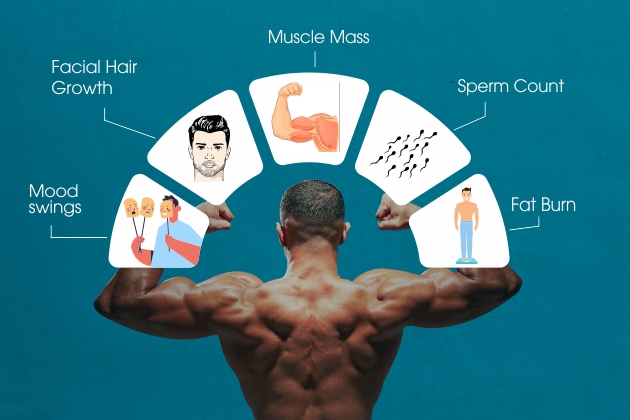In this blog post, we will explore the importance of testosterone for and we will also discuss how testosterone affects muscle mass, bone density, sexual health, mood, cognitive function, heart health, metabolism, and fat distribution.
We will also look at the signs of low testosterone levels and treatment options available for those experiencing low testosterone levels. Lastly, we will provide some tips on maintaining healthy testosterone levels to ensure optimal health and well-being.
Understanding Testosterone
Testosterone is a crucial hormone that affects many aspects of men’s health. Beyond its role in forming male sexual characteristics, testosterone also plays a vital role in maintaining muscle mass, bone density, and red blood cell production. However, low levels of testosterone can cause a range of health issues such as reduced sex drive, erectile dysfunction, and depression. To maintain optimal testosterone levels, it’s essential to have a healthy diet and exercise regularly. And for men diagnosed with low testosterone levels, testosterone replacement therapy can help restore energy, mood, and sexual function.

Importance of Testosterone for Men
· Muscle Mass and Bone Density
Maintaining strong muscles and healthy bones is essential for overall health and well-being. Testosterone plays a crucial role in building and maintaining muscle mass in men, as well as promoting bone density to prevent osteoporosis and fractures. Low testosterone levels can decrease muscle strength, lead to fatigue, and increase the risk of bone fractures. Regular exercise and a balanced diet are important for naturally boosting testosterone levels and keeping muscles and bones healthy. In some cases, hormone replacement therapy may be necessary to maintain optimal testosterone levels for muscle and bone health.
· Sexual Health and Libido
Testosterone is a hormone that plays a critical role in the sexual health and libido of men. When levels of testosterone drop, it can lead to a range of sexual problems, such as erectile dysfunction. However, maintaining healthy levels of testosterone through lifestyle changes like regular exercise and a balanced diet can help improve sexual function. For those with severely low levels of testosterone, hormone replacement therapy may be necessary to restore healthy levels. It is essential to consult a medical professional before starting any treatment.
· Mood and Cognitive Function
Testosterone plays a vital role in maintaining mood and cognitive function in men. Low levels of testosterone can lead to decreased mental clarity, depression, and anxiety. Studies have shown that testosterone replacement therapy can improve mood and cognitive function in men with low levels of testosterone. Moreover, testosterone also has a role in memory and spatial awareness, which can affect problem-solving capabilities and overall cognitive function. Thus, it is crucial to maintain healthy testosterone levels through diet, exercise, and lifestyle changes to ensure optimal mood and cognitive well-being.
· Heart Health
Maintaining healthy heart function is essential for overall well-being, and testosterone plays a crucial role in heart health for men. Studies have shown that low levels of testosterone are linked to an increased risk of cardiovascular disease. However, maintaining healthy testosterone levels through exercise and a balanced diet can positively impact heart health.
It’s important for men to monitor their testosterone levels and work with their healthcare provider to address any potential concerns. Testosterone therapy can also improve heart health in men with low testosterone levels, but it should only be considered under the supervision of a medical professional.
· Metabolism and Fat Distribution
Maintaining a healthy metabolism and proper fat distribution is essential for overall health and well-being in men. Testosterone plays a crucial role in regulating both of these functions, making it an important hormone to monitor.
Low testosterone levels can lead to an increase in body fat, particularly around the abdomen, which can increase the risk of metabolic diseases such as diabetes and obesity. On the other hand, higher testosterone levels have been linked to a lower risk of these diseases.
To maintain healthy testosterone levels, men should focus on regular exercise, a balanced diet, and potentially supplementation under the guidance of a healthcare provider. By prioritizing their testosterone levels, men can improve their metabolism and reduce the risk of adverse health outcomes.

Signs of Low Testosterone
Physical Symptoms
- Low testosterone levels can lead to a variety of physical symptoms in men.
- These symptoms may include decreased muscle mass and strength, increased body fat, and reduced bone density.
- Low testosterone can also cause erectile dysfunction and decreased sex drive.
- Additionally, other physical symptoms may include fatigue, hair loss, and sleep disturbances.
- It is critical to consult with your doctor if you are experiencing any of these symptoms as low testosterone levels can significantly impact your quality of life.
Detecting low testosterone early is crucial for effective treatment and avoiding potential consequences.
Emotional Symptoms
When testosterone levels decrease, it can have a significant impact on men’s emotional well-being. Low testosterone can lead to feelings of depression, anxiety, and irritability. Men may also experience a decrease in motivation and self-confidence. These emotional symptoms can be just as debilitating as the physical ones and should not be ignored. Additionally, low testosterone levels can affect a man’s sex drive and ability to maintain an erection, which can further contribute to negative emotions. If you suspect that you have low testosterone levels, it is important to consult with a healthcare professional who can provide guidance on the appropriate treatment options.
Tips to Maintain Healthy Testosterone Levels
Maintaining healthy testosterone levels is essential for men’s overall well-being. A healthy diet and regular exercise can promote natural testosterone production.
It’s also important to manage stress levels, get adequate sleep, and limit alcohol consumption since high-stress levels, poor sleep, and excessive alcohol intake can negatively impact hormone regulation in the body.
Additionally, natural supplements or medications may be considered under medical supervision if needed. By following these tips, men can maintain healthy testosterone levels and support their overall health and wellness.
Let’s Sum Up
In conclusion, testosterone is an essential hormone for men’s overall health and well-being. From maintaining muscle mass and bone density to regulating mood and cognitive function, it plays a crucial role in several bodily functions. However, low testosterone levels can lead to various physical and emotional symptoms, affecting the quality of life.
If you suspect low testosterone levels, consult with your healthcare provider for proper diagnosis and treatment options. Maintain healthy testosterone levels by incorporating lifestyle changes such as regular exercise, a balanced diet, stress management, and quality sleep.




